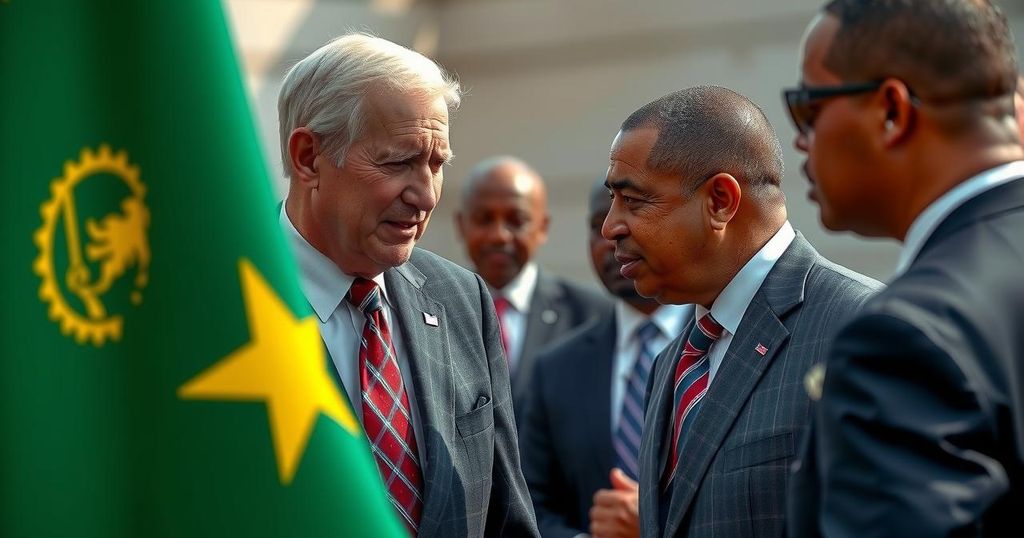President Biden Affirms U.S. Commitment to Africa Through Angola Visit
On December 3, 2024, President Joe Biden visited Angola, marking the first visit by a U.S. president. He pledged U.S. support for Africa, announcing a $3 billion investment in the Lobito Corridor railway project. The visit coincides with increased U.S.-Africa engagements amidst competition with China, with a focus on clean energy and public-private partnerships.
On December 3, 2024, United States President Joe Biden made a landmark visit to Angola, signifying the first appearance by a U.S. president in the nation. During his discussions with Angolan President João Lourenço, Biden affirmed America’s commitment to Africa by declaring, “The United States is all in on Africa.” He announced a substantial $3 billion investment aimed at the redevelopment of the Lobito Corridor railway project, which connects Angola to Zambia and the Democratic Republic of Congo. The project is integral for facilitating exports of essential raw materials that are crucial for batteries and clean energy technologies, with Biden planning a visit to the Lobito port that features prominently in this initiative.
This visit comes at a time of increased competition with China, which recently imposed an export ban on critical materials such as gallium and germanium, following U.S. actions that expanded export controls on Chinese technological firms. The Lobito Corridor project has garnered widespread backing from the European Union, G7 countries, private sector consortiums, and various African financial institutions. Notably, White House national security spokesperson John Kirby remarked on the multi-year timeline for the project’s completion, while emphasizing the progress that has been achieved thus far.
During his stay, President Biden also took the opportunity to visit the National Slavery Museum in Angola, located within the historical Capela da Casa Grande. This site holds significant importance as it encapsulates the shared history of slavery between the United States and Angola. Additionally, he met with Wanda Tucker, a descendant of William Tucker, who was the first enslaved child born in the U.S. after his parents were forcibly brought from Angola in 1619. President Biden’s agenda also included engaging with African business leaders and exploring avenues for enhancing public-private partnerships focused on energy production, as highlighted during his discussions with President Lourenço.
President Biden’s visit to Angola marks a strategic move in fostering stronger U.S.-Africa relations, particularly amid global economic dynamics influenced by competing powers like China. The Lobito Corridor redevelopment project serves as a crucial initiative to improve infrastructure and trade links not only for Angola but also for its regional neighbors. This focus on clean energy technologies aligns with global sustainability goals and demonstrates the U.S. intention to be a key player in Africa’s developmental landscape. The historical context of slavery also underscores the longstanding ties and shared narratives between the U.S. and Angola, lending to the significance of Biden’s visit.
In summary, President Joe Biden’s historic visit to Angola represents a commitment to strengthening U.S.-African partnerships, highlighted by significant investments like the Lobito Corridor project. The visit underscores a pivotal moment in international relations as the U.S. seeks to bolster ties with African nations amid growing influences from other global powers. Moreover, the acknowledgment of shared historical experiences related to slavery enhances the narrative of cooperation and mutual understanding between the two nations.
Original Source: indianexpress.com




Post Comment